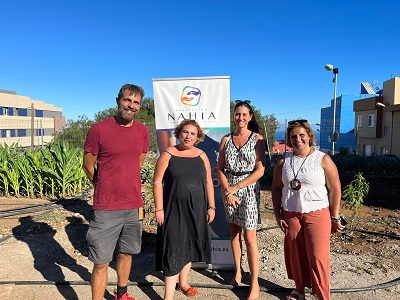- The initiative aims to provide these young people with basic social language skills to enable them to interact socially and in the workplace
- The project was one of seven winners in the last edition of the Social Value Awards in the Canary Islands
The project, which directly benefits 70 people, is committed to the development of people who, due to their age, do not have access to traditional formal training, promoting their ability to understand and express themselves. Currently, the largest number of people served are young men between the ages of 16 and 20 from Senegal, Mali, Guinea, Ivory Coast and, to a lesser extent, Morocco.
The head of Fundación Cepsa in the Canary Islands, Belén Machado, together with the chair of the Asociación Asistencial Nahia, Laura Sosa, held a meeting to learn in detail about the status of the project, attending the reactivation, with the end of summer, of the activities included in the program. The first action focused on an agricultural workshop that takes place at the urban garden in El Sobradillo.
Belén Machado highlighted the role played by the project "to promote learning and functional use of language as a necessary communication tool." It is an aspect that is even more relevant in this case, taking into account, she explained, that "these young people arrive in the Canary Islands without the ability to communicate effectively, which has a negative impact on their social integration." She insisted that "it is essential to have learning spaces adapted to their condition and needs."
Laura Sosa, meanwhile, explained that the entity has been undertaking activities for the linguistic inclusion of migrant minors since 2018, adapting them to the new needs and realities of young people. However, she said, "thanks to the support of Fundación Cepsa, it has been possible to reinvent the program by opening it up to volunteering and creating alternative learning spaces, through the recovery of traditional trades such as agriculture, sewing and upholstery," said Sosa.
She also stressed that one of the activities that generates the greatest interest among migrant minors is the urban vegetable garden in El Sobradillo, a space provided by Asociación Giro, which they tend to for two hours a week and where they advance in linguistic integration through the teaching of agricultural work.
She explained that they start growing and harvesting produce such as millet, potatoes, zucchini, spinach, pumpkins, onions and lettuce, which are also donated through Asociación Giro to soup kitchens.
Asociación Asistencial Nahia also runs tapestry and sewing and literacy workshops, as well as two cultural outings per month where the young participants can use the language in everyday environments. This activity will be resumed next week, with plans for routes along trails of Tegueste and Teide, where they will learn about the peculiarities of each area from a biodiversity perspective.
These recreational activities are in addition to other visits already made to the Lercaro Museum, the Museum of Science and the Cosmos, the Carnival House, the Botanical Garden or the historic center of La Laguna, to promote knowledge, conservation and respect for the natural and cultural environment of Tenerife.
The program also includes specific activities focused on training related to job skills, active job search, conflict resolution and information and communication technologies as an insertion tool.

